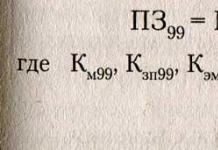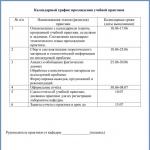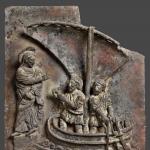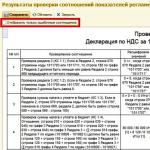1. He stood in front of me, listened, and suddenly, silently baring his teeth and squinting his eyes like a cat, he rushed at me (M. G.). 2. Getting up, he pushed Annushka away; She almost fell, recovered, and as if having woken up, looked at the armless man with dull and dull eyes (M.G.). 3. Having followed the shadows that trembled on the ceiling, Tikhon Pavlovich turned his eyes to the front corner of the room (M. G.). 4. Dull copper sounds flying from the bell tower quietly floated in the air and fell without a trace. A branch crunched in the garden, and in the grove the bittern died out again, as if laughing with a gloomy laugh (M.G.). 5. ...A gloomy thundercloud, frowning and muffledly grumbling, slowly creeps over the ground (M.G.). 6. Tikhon Pavlovich, slowly biting his beard, walked up to the table, holding his hands back and gloomily looking at his wife’s back (M. G.). 7. Lukich cheerfully ran up to the station, and the train approached him, whistling and throwing a thick rope of white steam in the air, filling the air with a heavy roar (M. G.). 8. He paused, waiting for her to get up and leave. But she did not leave and, yawning, continued to sit next to him (M. G.). 9. They left the garden, and the miller, asking where to go, shouted to the cabman. Bouncing along the uneven pavement, the carriage rolled with a rattling sound between two rows of houses... Driving past one small white house behind the front garden, Tikhon Pavlovich heard peals of deep laughter (M.G.). 10. Kuzma looked sideways into the owner’s face and walked away whistling (M. G.). 11. There was one [son] - the first and the last. He worked tirelessly for him (Sh.). 12. ...Grandfather Gavrila woke up. Hanging his legs from the stove, holding on to the butt, he coughed for a long time (Sh.). 13. Looking back, I saw how three people in sheepskin coats, unfriendly and scattered, getting stuck in the snowdrifts, ran to the threshing floor (Sh.). 14. Life returned to him slowly, as if reluctantly (Sh.). 15. Having thought about it, I wanted to ask about something, but I heard even breathing through my nose and, holding my balance with my hands, I walked away from the bed on tiptoe (Sh.). 16. One day, two days after Petro went out into the yard for the first time before going to bed, anointing himself on the stove, he asked Gavrila: “Where are you from, son?” (Sh.). 17. Despite the fact that all the Red Army soldiers who crossed the threshold of Gavrila’s house, looking at his hair, neatly bleached with gray, called him father, this time Gavrila felt a warm note in the tone of his voice (Sh.). 18. Prokhor, having trampled the cart for the second time, curled up in a ball, tucked his legs and fell asleep. Styopka lay down on the ground. Having thrown on his coat to protect himself from the dew, he lay looking at the beaded sky at the dark figures of bulls plucking the unmown grass (Ш). 19. Styopka ran to Prokhor and hurried through the gardens to the house (Sh. ). 20. Visited the last islands of the southern forests, starting with the Buzuluk oasis at the junction of the Orenburg and Trans-Volga steppes (Leon). Exercise 37. Rewrite, adding the missing punctuation marks; explain their placement or absence in gerunds and participial phrases. 1. Tatyana loves seriously (P.). 2. Alyosha looked long and somehow narrowed his eyes at Rakitin (Dost.). 3. The janitor looked at Raskolnikov with bewilderment and a frown (Dost.). 4. The spindles made noise evenly and incessantly from different sides (L.T.). 5. Everyone usually approached the office doors whispering and on tiptoe (L. T.). 6. He fell silent and sat motionless for a long time, raising his eyes to the sky (T.). 7. And I... motionless and without taking my eyes off her face, looked at her (M. G.). 8. We came there and sat on two poufs next to each other and holding hands (M. G.). 9. “I came to the fair,” the lady explained in a quiet voice and without raising her eyes (M.G.). 10. The students made noise incessantly. 11. The students made continuous noise without stopping. 12. There in the darkness someone’s eyes looked without blinking (A.K.T.). 13. He worked tirelessly. 14. “You know, everyone has had such ice holes,” Lisa interjected politely and boredly (Leon.). 15. The road winds between the bushes (L.). 16. Veretyev sat bending over and patting the grass with a branch (T.). 17. Cranes usually sleep standing up (Ax.). 18. Seagulls wander around the shallows and only occasionally cry out hoarsely and out of breath (M. G.). 19. Mother got up from the table and slowly walked away to the window and turned her back to everyone (M. G.). 20. ...A cloud of bluish smoke fluctuates above people’s heads without disappearing (M. G.). 21. Sergei pushed Vera aside, nodded to her and left whistling (A.T.). Exercise 38 . Write the text from dictation. Explain the use of punctuation marks in gerunds and participial phrases. The foal was carried away by the current far from the place where the squadron was crossing. A small swirl smoothly circled him, licking him with green, crested waves. Trofim frantically waved his oar, the boat moved in leaps and bounds. On the right bank, Cossacks jumped out of the ravine. The bass drum of “Maxim” began to drum. The bullets hissed as they smacked into the water. An officer in a torn canvas shirt shouted something, waving a revolver. The foal neighed less and less, the short, cutting cry became muffled and thinner. And this cry was coldly and terribly similar to the cry of a child. Nechepurenko, abandoning the mare, easily swam to the left bank. Trembling, Trofim grabbed the rifle, fired, aiming below the head that had been sucked in by the whirlwind, tore his boots off his feet and, with a dull grunt, stretching out his arms, plopped into the water. On the right bank, an officer in a canvas shirt barked: “Stop shooting!” Five minutes later, Trofim was near the foal, with his left hand he grabbed it under his cold belly, choking, hiccuping convulsively, and moved to the left bank... From the right Not a single shot hit the shore. The sky, the forest, the sand - everything is bright green, ghostly... The last monstrous effort - and Trofim’s feet scrape the ground. He dragged the slimy body of the foal onto the sand... The voices of the squadrons that had swam across the forest were buzzing, and gun shots rattled somewhere behind the spit. The red mare stood next to Trofim, shaking herself and licking the foal. A rainbow stream fell from her drooping tail, sticking into the sand. Trofim swayed to his feet, walked two steps along the sand and, jumping, fell on his side. It was as if a hot prick penetrated my chest; falling, I heard a shot. A single shot in the back - from the right bank. On the right bank, an officer in a torn canvas shirt indifferently moved the bolt of his carbine, throwing out a smoking cartridge case, and on the sand, two steps from the foal, Trofim was writhing, and his hard, blue lips, which had not kissed a child for five years, smiled and foamed with blood. (M. Sholokhov) 2.5.6. Punctuation marks in circumstances expressed by nouns and adverbs 1. Circumstances expressed by nouns in the forms of indirect cases can be isolated for incidental explanation or semantic emphasis. This emphasis is facilitated by the presence of explanatory (dependent) words with nouns: One of the spots, in the center of the pattern, very much resembled the head of the owner of the chair (M. G.); The small city, immersed in greenery, when looking at it from above, made a strange impression. .. (M. G.); The rafts sailed further, amid darkness and silence (M.G.); When evening came, I, out of anger at my failures and at the whole world, decided on a somewhat risky thing... (M. G.); At night, against the strengthening wind, the detachment went to the port to land (Pl.). Such circumstances usually carry an additional semantic load and are synonymous with verbal constructions (cf. at least the penultimate example: ... because he was angry at his failures and at the whole world). 2. Most often, such explanations include derived prepositions and prepositional combinations (due to, in spite of, in view of, in order to avoid, as a result of, on occasion, due to, in the presence of, in accordance with, in contrast to, in contrast to, due to, for absence, if present, regardless of, etc.), manifesting their specific circumstantial meaning and giving them the form of turns: A rotten, gray-blue balcony with time, from which, due to the lack of steps, it was necessary to jump, was drowning in nettles, elderberries, and euonymus (Boon.); Far ahead and to the right, probably under the blackening mountains, there was a shot. Lonely and unnecessary, in view of this peace, the peaceful sound of chewing horses, in view of the desertion, was imprinted in the darkness, and already there was silence again (Ser.); Metelitsa silently, mockingly stared at him, holding his gaze, slightly moving his satin black eyebrows and with his whole appearance showing that, no matter what questions they ask him and how they force him to answer them, he will not say anything that could satisfy those asking (F.); Due to the urgency, the drawings were sent with the opportunity (Paust.). Given the low prevalence of such sentence members, variations in their punctuation are possible, dictated by different word orders. Phrases with derived prepositions and prepositional combinations are necessarily isolated if they are located between the subject and the predicate: breaking their direct connection helps to isolate the phrases. The same thing happens when the natural connection between the controlling and controlled words is broken. In other positions, especially in less common sentences, such phrases do not complicate the sentence with special emphatic intonations and may not be isolated (without a special assignment); Wed: Thanks to the rains, the crops have recovered. - Thanks to the rains, the crops have recovered; To prevent gas leakage, the tap is turned off. - The tap is turned off to avoid gas leakage; He did it out of habit. - He, by force of habit, did it; According to the order, the group was disbanded. - The group, according to the order, has been disbanded; Due to lack of evidence, the case was dropped. - The case was closed due to lack of evidence. 3. Circumstances expressed by nouns can be highlighted with a dash if there is a need for special emphasis on such circumstances: It [the creative imagination] created both science and literature. And - at great depth - the creative imagination of at least Herschel, who discovered the majestic laws of the starry sky, and the creative imagination of Goethe, who created “Faust” (Paust.); Poor poets - in lightning, in storms and thunder - sang inspired songs about the charm of friendship, noble impulses, freedom and courage (Paust.); Immediately after the birth of the boy, Dyakonov ordered Schwalbe to adopt him and give him the surname Koporsky at baptism - after the boy’s birthplace in the town of Koporye, near Oranienbaum (Paust.). 4. In special cases, for semantic emphasis, certain circumstances expressed by adverbs (with or without dependent words) may be isolated. The conditions for their isolation are the same as for the circumstances expressed by nouns in indirect cases: He stood in front of another, listened and suddenly, silently, baring his teeth and squinting his eyes, he rushed at me like a cat (M. G.) [cf.: In the open the window poured from the garden, along with the quiet and warm night wind, the rustling of leaves, the smell of earth and damp leather (M.G.)]. Usually, when isolating circumstances expressed by adverbs, commas are used, however, as in other cases, in order to more actively highlight the circumstance, dashes are possible: The boy sniffed embarrassedly, incredulously, but, realizing that there was nothing terrible, but everything, on the contrary, he comes out terribly cheerfully, wrinkled so that his nose turned up, and also - quite childishly - burst into mischief and thinness (F.). Exercise 39. Find the circumstances. Determine the ways of expressing them and the conditions for isolation or non-isolation. Explain the use of punctuation marks. 1. Only silvery dust remains. But when the girls, foolishly, erased it a few days later, Aunt Tonya became hysterical (Bun.). 2. An eagle owl, with a rustling sound, brushing the straw with its wings, fell off the roof - and fell low somewhere into the darkness (Bun.). 3. And Natasha’s fault was that, completely unexpectedly for herself, she stole Pyotr Petrovich’s folding mirror, framed in silver (Bun.). 4. ...And the most terrible and festive thing was behind the garden, in an abandoned bathhouse, where a double mirror in a heavy silver frame was kept - behind the garden, where, while everyone was still sleeping, Natasha ran secretly through the dewy thickets to enjoy the possession of her treasure, take it out to the threshold, reveal it in the hot morning sun and look at herself until you feel dizzy, and then hide it again, bury it and run again, serve all morning to the one to whom she did not even dare to raise an eye, for whom she, in an insane hope liked it, and looked in the mirror (Bun.). 5. And Natasha, with painful surprise, looked at the dressed-up people (Bun.). 6. She slept alone, in the corridor, near the door to the young lady’s bedroom (Bun.). 7. Natalya Petrovna secretly prayed, secretly cried and was pitiful when she slowly climbed out of bed at night, by the light of a lamp, thinking that her husband was sleeping, and began to kneel with difficulty and fall to the floor with a whisper (Bun.). 8. And along the gorge, in darkness and splashes, the stream rushes towards the sea, rattling stones (M. G.). 9. Once, near Yalta, I hired myself to clear an orchard of cut branches (M.G.). 10. I walked and walked along the cold and damp sand, trilling with my teeth in honor of hunger and cold, and suddenly, in a vain search for food, going behind one of the stalls, I saw behind it a figure crumpled on the ground in a pitiful dress (M.G .). 11. Noticing Seryozha, he stared at him with pampered curiosity, somewhat impudently, with his knowing, bulging eyes, like his father’s (F.). 12. I often felt loneliness - vaguely and heavily (Paust.). 13. The two older guys were already working and soon, one after the other, they entered military courses (Ast.). 14. More and more often in my old age, I think about our purpose, in other words, and more simply, about our life on earth, which we, with all the reasons for ourselves, called sinful (Ast.). 15. Don’t worry about your leg, they will give you a new one, in a government place and at the expense of the treasury (Ast.). Exercise 40. Rewrite the sentences. Determine the syntactic role and conditions for isolating highlighted words and combinations. 1. Bulba, on the occasion of the arrival of his sons, ordered to convene all the centurions and the entire regimental rank (G.). 2. I stood on the corner of the platform, firmly resting my left foot on the stone and leaning forward a little so that, in case of a slight wound, I would not tip back (L.). 3. Wanting to completely seduce everyone sitting on the line, I fell behind a little, then, with the help of a whip and legs, I dispersed my horse... (L. T.). 4. My mental state was as if, on someone’s orders, I was going with a spear to a bear (Ch.). 5. And then he met her in the city garden and in the square, several times a day (Ch.). 6. In contrast to his wife, the doctor was one of those natures who, during times of mental pain, feel the need to move (Ch.). 7. Then, with slow steps, the boy, looking back at the shoemaker, walked along the panel (M.G.). 8. One evening, having picked porcini mushrooms, on the way home, we went out to the edge of the forest (M.G.). 9. Not without effort on himself, Thomas continued, smiling embarrassedly... (M.G.). 10. She will go there on the first of December, but I, for the sake of decency, at least a week later (Bun.). 11. At that moment, she had some similarity with Philip, as if they were united by one thought (Fed.). 12. I almost recovered... therefore, upon leaving the hospital, I settled in the apartment on the right corner of the building on Amilego Street (Green.). 13. I was alone, in silence, measured by the sound of the clock (Green). 14. She looked after the guest and, at the same time, felt sorry for her (Ch.). 15. Ahead of everyone, in a charabanc, rode Samoilenko and Laevsky (Ch.). 16. At long tables, elbow to elbow, scribes scratch with pens (A.T.). Exercise 41 . Match the sentences given in pairs. Explain punctuation marks. 1. If I wanted, I could find the girl very easily (Green). - If I wanted, I could find the girl very easily. 2. For all these reasons, I rejected his proposal and returned to my place. - For all these reasons, I rejected his offer and returned to my place. 3. Not without reason, I expected, due to the contradiction of this, an unpleasant, in its meaning, effect... (Green). - I, not without reason, expected an unpleasant effect. 4. I still read quite well; as before, I can hold the attention of listeners for two hours (Ch.). - As before, I can hold the attention of listeners for two hours. 2.5.7. Punctuation marks for phrases with the meaning of inclusion, exclusion and substitution. Revolutions with the meaning of inclusion, exclusion and substitution (so-called additions) name objects included in a homogeneous series, or, conversely, excluded from it, or objects that replace others. They are highlighted or not separated by commas according to the conditions of the context: depending on the degree of their distribution, their location in the sentence. Such phrases include prepositions and prepositional combinations except, along with, besides, including, excluding, with the exception of, over, instead of, etc.: The detachment, with the exception of three or four “homeless” people, as usual, broke up into groups (F.); Hence Tolstoy’s love for folk art, for folklore, and his enormous, recently begun work on collecting together all the folklore of the Soviet Union - work that, in addition to everything, has great purely scientific significance (Paust.). The phrase with the word except has two meanings: a) one coincides with the meaning of the words except, i.e. the turn has the meaning of exclusion from a number of similar objects: For a long time nothing was visible except the rain and a long man lying on the sand by the sea (M. G.); No matter how hard Vikhrov looked, he could not see anything in the darkness except a whitish oblong spot (Leon.); Vershinin sent the meadowmen to the institute, all except Sviridova - he included her in the high-mountain detachment (Zal.); b) another meaning - the opposite - is a designation of inclusion in a number of similar objects: Bunin, in addition to brilliant, completely classic stories, has drawings of extraordinary purity (Paust.); In addition to students, teachers also came to the conference. Currently, differences in the meanings of phrases with the word except do not affect punctuation: in both cases, separation is necessary. However, in the recent past, phrases with the meaning of inclusion were not distinguished by punctuation marks. The preposition instead, which has the meaning of substitution, can be used either as an independent construction not controlled by the predicate verb, or as a construction dependent on the predicate verb. In both cases, the phrase is highlighted (or separated) by commas, although when depending on the predicate verb, the separation is optional. Wed. examples: Instead of answering, he started pushing my head into my chest (M. G.). - Instead of a hat, he bought himself an old cap (M. G.). In sentences, He slowly walked around all the harbors and all the piers - incredibly thin and solemn, like Don Quixote, leaning instead of a knight’s spear on a thick stick (Paust.); Natalya tried to smile, but instead of a smile, a pitiful grimace distorted her face (Sh.) The preposition instead means “in return”; It is in such cases that separation is not necessary, especially in the absence of distribution of turnover. The preposition instead can also have the meaning of the preposition for. In this case, the turnover with instead is not isolated: He got into the cab of the car instead of the driver (for the driver, as a driver). Exercise 42 . Find revolutions with the meaning of inclusion, exclusion and substitution. Explain the use of punctuation marks. 1. In addition to the city of Okurova, the small village of Voevodino (M.G.) is located on the plain. 2. The clearing and the fontanel were overgrown with hazel, everything around became half-dead, except for the Wasteland, mysteriously turning blue ahead (Leon.). 3. Apart from the large house in Zamoskvorechye, nothing reminded of the night battle (Leon.). 4. Otherwise, except for the little things, everything was fine (Leon). 5. Don’t forget to identify all existing problems and trends, including the human factor (gas.) 6. Tourism has two possibilities. In addition to its main goal - to strengthen a person’s health and prepare him for active work, it also enriches him spiritually (gas). 7. Instead of notebooks, the student bought a beautiful album. 8. The student, instead of notebooks, bought a beautiful album. 9. Three Komsomol members came to the meeting, besides me. 10. Along with others, I went on an excursion. 11. The weather, beyond expectation, was favorable for departure. 12. The weather was more favorable than expected for departure. 2.6. Punctuation marks for clarifying, explanatory and connecting members of a sentence. Clarifying, explanatory and connecting members that complicate a simple sentence are united by the common function of an additional message and emphatic intonation. The general function of an additional message can be specified in different ways. Clarifying members of a sentence, referring to a particular word in a sentence, narrow the concept it expresses or limit it in some way. Most often, the circumstances of place and time are specified, since both of them can be designated too generally and vaguely (there, there, from there; everywhere, everywhere; then, then): It seemed that there, at the edge of the sea, there were endless amounts of them [clouds] a lot (M.G.); Everywhere, both above and below, larks sang (Ch.). Explanatory members of a sentence are second names in relation to the first ones, expressing a particular concept is not sufficiently specific or for some reason is not clear enough. These members of the sentence may have an indication of their explanatory nature, i.e. to have special unions (that is, namely, or “that is”): Someone came out of the house and stopped on the porch: this is Alexander Timofeich, or simply Sasha, a guest who arrived from Moscow ten days ago (Ch.). The connecting members of the sentence have the nature of additional information, reported incidentally, in addition to the content of the main statement: At night, especially during a thunderstorm, when the garden was raging in the rain, the faces of images constantly lit up in the hall, the trembling pink-golden sky opened up and swung open over the garden, and then, in the darkness, thunderclaps rolled out with a crash - it was scary in the house at night (Boon. ). 1. Clarifying members of the sentence are isolated, i.e. separated by commas (or separated by a comma if they are at the end of a sentence). Most often, the significance of clarification is acquired by the circumstances of place, time, degree, measure, mode of action: Downstairs, in the hall, they began to put out the lights (Ch.); Rahim lies with his chest on the sand, his head to the sea, and thoughtfully looks into the muddy distance (M. G.); In the grove, behind the dam, a bittern was hooting (M. G.); There, on the horizon, from where the cloud floated into the sky, a pale pink strip of light shone (M. G.); The vast space was flooded by the river during the flood, and now, far away, right up to the horizon, silver spots were scattered across the meadows (M. G.); On the eighth of July, Friday, Elizarov, nicknamed Kostyl, and Lesha were returning from the village of Kazanskoye (Ch.); It was on this eve, before the storm, that some significant incidents happened for Ivan Matveich (Leon.); Vikhrov lived the pre-war winter in St. Petersburg, at home in Lesnoy, in nature (Leon.). Clarifying circumstances, which are emphasized to a greater extent, are highlighted with a dash: Sergei Sergeich approached Andrei, painfully - with anger - he patted him on the cheek (V. Sh.). In addition to the circumstances, definitions may be clarified. Usually the clarifications relate to age, color, size, etc.: A minute later they passed the sleepy desk, came out onto deep sand up to the hub and silently sat down in a dusty cab (Bun.). The clarifying nature of the members of a sentence can be enhanced by special words such as more accurately, more accurately, otherwise (they have the meaning of introductory words). Since the introductory word is highlighted, a comma is not placed after the clarifying term: Any annual session of the academy is, of course, first of all, a conscientious report of scientists. The report is what heights, or rather, depths, have been achieved in the knowledge of nature... (gas.). 2. Explanatory members of the sentence are separated (or highlighted) by a comma: For Konstantin Levin, the village was a place of life, that is, joys, suffering, labor (L. T.); The feeling belonged to home. It said that at this moment he was uninhabited, that is, abandoned by everyone alive except Seryozha and his worries (Past.); These people were their own, suburban (M. G.); In the infinity of new and new discoveries, in the roar of incredible incidents, for the first time I felt like not Chekhov’s Chechevitsyn, not a high school student dreaming of escaping to the pampas, but a true reader, that is, a person who, at the long-awaited hour, is left alone with a book (Kav.). If there are words warning about explanation, a dash is placed: One thing has interested him lately - painting; The goal set for the detachment was one - to reach the forest before dawn. In such sentences, a dash replaces the missing explanatory conjunction: Baikal is glorious and holy for another reason - for its wonderful, life-giving power (Exp.). The omission of a conjunction can also be indicated by a dash in sentences without special warning words for explanation: The task assigned to the detachment was difficult - to reach the forest before dawn. However, in print, with such explanations, a colon is also used, which can be perceived as a variant design of the structure with a more emphasized explanation: All of them [letters] are about the main thing: perestroika in our life (gaz.). 3. The connecting members of the sentence containing additional explanations or any comments are highlighted (or separated) by commas (with a long pause - a dash). Connecting constructions included in a sentence are usually joined by words and combinations even, in particular, especially, mainly, including, in particular, for example, and moreover, and therefore, yes and, and only, and in general, and too, etc.: Everyone, including the funny bouncing guy, reached out to the window (Ch.); I believe that it is precisely this - the mystery or the premonition of it - that is lacking not only in your story, but also in all the works of your peers, especially modern lyrics (Ast.); A large, also square, window looked out onto the garden (Hall); I studied well at school, especially in French (Gaz.). It is also possible to highlight using a dash: Suddenly, interrupting her memories of the guys, a distant, distant day appeared in front of her - and also with a river (Dist.). 4. Connecting constructions that do not have special connecting words (non-union joining) are separated using a dash or even a dot (with parcellation, conjunctions are possible, see more about this in the section “Punctuation marks that interrupt a sentence”), which more sharply delimit them from the main one statements: The old woman accepted the death of the old man as fate - no more and no less (Exp.); The stairs will also disappear - until next time (Disp.); The old woman looks at him and smiles patiently. Then he speaks - all with the same patient smile (Adv.); Knyazev, along with everyone else, crossed the street and walked slowly along the other side of the street - just like that, out of nothing to do (V. Sh.); Although Kuzma told Aunt Natalya that Maria was crying, she did not cry anymore. She was silent (Dist.); Many names can be mentioned. And those who are no longer with us, and those who are among us today (gas); There are about two thousand of them - these delegate requests. Neat leaves, slightly wrinkled. Written with different inks. Questionnaires. True, not those where they write the year and month of birth. With suggestions. Important and secondary, small and state (gas); A brush and a trowel - that’s all the scientific and technological progress in this industry. And not only this one (gas). Exercise 43. Find the isolated parts of the sentence. Define their functions and explain the use of punctuation marks. Describe the conditions for punctuation of clarifying, explanatory and connecting members of a sentence, including parceled constructions.
Taman
Taman is the nastiest little town of all the coastal cities in Russia. I almost died of hunger there, and on top of that they wanted to drown me. I arrived on a transfer cart late at night. The coachman stopped the tired troika at the gate of the only stone house at the entrance. The sentry, a Black Sea Cossack, hearing the ringing of the bell, cried out in a wild voice, awake: “Who’s coming?” Came out constable And foreman I explained to them that I was an officer, going to the active detachment on official business, and began to demand a government apartment. The foreman led us around the city. No matter which hut we approach, it’s busy. It was cold, I didn’t sleep for three nights, I was exhausted and starting to get angry. “Lead me somewhere, robber, even to hell, just to the place!” – I shouted. “There is one more vatera,” answered the foreman, scratching the back of his head, “but your honor will not like it; there unclean!” Not understanding the exact meaning of the last word, I told him to go ahead and after a long wandering through dirty alleys, where on both sides I saw only dilapidated fences, we drove up to a small hut on the very shore of the sea.
A full moon shone on the reed roof and white walls of my new home; in the courtyard, surrounded by a cobblestone fence, stood shying away another shack, smaller and older than the first. The shore sloped down to the sea almost right next to its walls, and below, dark blue waves splashed with a continuous murmur. The moon quietly looked at the restless, but submissive element, and I could distinguish in its light, far from the shore, two ships, whose black rigging, like a cobweb, was motionless on the pale line of the sky. “There are ships in the marina,” I thought, “tomorrow I’ll go to Gelendzhik.”
(246 words)
(M. Lermontov. Hero of our time)
Quests
1. In the penultimate sentence, underline all independent parts of speech as members of the sentence. Describe this proposal and determine what makes it special.
2. Give the interpretation of the highlighted words: constable, foreman, fatera, carefree, unclean.
Night Journey
The moon shone through the window, and its beam played across the earthen floor of the hut. Suddenly, a shadow flashed across the bright stripe crossing the floor. I stood up and looked out the window: someone ran past him a second time and disappeared God knows where. I could not believe that this creature would run away along the steep bank; however, he had nowhere else to go. I stood up, put on my beshmet, belted my dagger, and quietly left the hut; a blind boy meets me. I hid by the fence, and he walked past me with a faithful but cautious step. He carried some kind of bundle under his arm, and, turning towards the pier, began to descend along a narrow and steep path. “On that day the dumb will cry and the blind will see,” I thought, following him at such a distance as not to lose sight of him.
Meanwhile, the moon began to become cloudy and fog rose on the sea; the lantern on the stern of the nearest ship barely shone through it; the foam of boulders sparkled near the shore, threatening to drown him every minute. I, with difficulty descending, made my way along the steepness, and then I saw: the blind man paused, then turned down to the right; he walked so close to the water that it seemed like a wave would grab him and carry him away; but, apparently, this was not his first walk, judging by the confidence with which he stepped from stone to stone and avoided ruts. Finally he stopped, as if listening to something, sat down on the ground and placed the bundle next to him. I watched his movements, hiding behind a protruding rock on the shore. A few minutes later a white figure appeared from the opposite side; she went up to the blind man and sat down next to him.
(245 words)
(M. Lermontov. Hero of our time)
Quests
1. Determine the similarities and differences between the syntactic structure of the first sentence of the 1st paragraph and the beginning of the first sentence (two parts connected by the conjunction And ) 2nd paragraph.
2. Underline the grammatical basics of the second sentence of the 2nd paragraph, mark them with numbers and draw a diagram (vertical) of the sentence.
10th grade
Oddities on the Patriarch's
One day in the spring, at an hour of unprecedentedly hot sunset, two citizens appeared in Moscow, on the Patriarch's Ponds. The first of them, dressed in a gray summer pair, was short, well-fed, bald, carried his decent hat like a pie in his hand, and on his well-shaven face were glasses of supernatural size in a black horn-rimmed frame, the second was a broad-shouldered, reddish, shaggy young man in a checkered cap twisted at the back of his head - he was wearing a cowboy shirt, chewed white trousers and black slippers.
The first was none other than Mikhail Alexandrovich Berlioz, chairman of the board of one of the largest Moscow literary associations, called Massolit for short, and editor of a thick art magazine, and his young companion was the poet Ivan Nikolaevich Ponyrev, writing under the pseudonym Bezdomny.
Finding themselves in the shade of slightly green linden trees, the writers first rushed to the colorfully painted booth with the inscription “Beer and water.”
Yes, the first strange thing of this terrible May evening should be noted: not only at the booth, but in the entire alley parallel to Malaya Bronnaya Street, there was not a single person. At that hour, when, it seemed, there was no strength to breathe, when the sun, having heated Moscow, fell in a dry fog somewhere beyond the Garden Ring, no one came under the linden trees, no one sat on the bench, the alley was empty.
Here a second strange thing happened, concerning only Berlioz. He suddenly stopped hiccupping, his heart pounded and for a moment sank somewhere, then returned, but with a dull needle stuck in it. In addition, Berlioz was gripped by an unreasonable, but so strong fear that he wanted to immediately flee from the Patriarch's without looking back.
Berlioz looked around sadly, not understanding what frightened him. He turned pale, wiped his forehead with a handkerchief, and thought: “What’s wrong with me? This never happened... my heart is racing... I'm overtired. Perhaps it’s time to throw everything to hell and go to Kislovodsk...” And then the sultry air thickened in front of him, and from this air a transparent citizen of a strange appearance was woven. On his small head is a jockey cap, a checkered, short, airy jacket... The citizen is a fathom tall, but narrow in the shoulders, incredibly thin, and his face, please note, is mocking.
(316 words)
(According to M.A. Bulgakov)
Quests
1. Draw a vertical diagram of the second sentence of the 4th paragraph and describe it.
2. In the last sentence, underline all the words as members of the sentence. Describe him.
3. Do you know what it is equal to? fathom, those. How tall was the “citizen”?
There was a case in Griboedov
The restaurant began to live its usual nightlife and would have lived it until closing, if something had not happened that was completely out of the ordinary and struck the restaurant guests much more than the news of Berlioz’s death.
Out of nowhere, a light flashed at the cast-iron grate and began to approach the veranda. Those sitting at the tables began to rise and peer and saw that a white ghost was walking towards the restaurant along with the light. When it approached the trellis itself, everyone seemed frozen at the tables with pieces of sterlet on their forks and their eyes wide. The doorman, who at that moment came out of the door of the restaurant hanger into the courtyard to smoke, trampled on his cigarette and moved towards the ghost with the obvious purpose of blocking his access to the restaurant, but for some reason he did not do this and stopped, smiling stupidly.
 |
And the ghost, passing through the hole in the trellis, unhinderedly entered the veranda. Then everyone saw that this was not a ghost at all, but Ivan Nikolaevich Bezdomny, a famous poet.
He was barefoot, wearing a torn whitish sweatshirt, to which a paper icon with a faded image of an unknown saint was pinned to his chest with a safety pin; in his hand, Ivan Nikolaevich carried a lit wedding candle. Ivan Nikolaevich’s right cheek was freshly torn. It is difficult even to measure the depth of the silence that reigned on the veranda; one of the waiters could see beer flowing from a mug that was tilted to one side onto the floor.
Here, from the inner hall, people poured onto the veranda, and a crowd moved around Ivanov’s fire.
Ivan became restless, pushed those around him, began waving the candle, pouring wax on himself, and looking under the tables.
Then they decided to rush at Ivan. The candle went out, and the glasses, which had fallen off someone’s nose, were instantly trampled upon. Ivan let out a terrible battle cry, heard, to the general temptation, even on the boulevard, and began to defend himself. Dishes clattered as they fell from the tables, and women screamed.
(275 words)
(According to M.A. Bulgakov)
Quests
1. In the second sentence of the 2nd paragraph there are two conjunctions And. Use arcs to indicate which words are connected and how they are connected.
2. Write out all the particles from the 1st and 2nd paragraphs.
3. Give examples from the text: 1) archaism; 2) neologism; 3) phraseology.
E.I. VIGDOROVA,
Moscow
1.Indicate the sentence with an appeal. No punctuation marks: 1) At this moment, the listeners turned to the door; 2) Here Sasha was able to change clothes and relax; 3) Now, dear readers, you will learn the most important thing; 4) All evening Polina sat on pins and needles. 2. Indicate a series in which all words are never watery: 1) It should probably be so; 2) even, as if, just; 3) fortunately, of course, of course; 4) apparently, on the contrary, for example; 3. Indicate a sentence complicated by water words. Punctuation marks are not placed: 1) The river seemed to fall asleep until spring; 2) There are different opinions on this matter; 3) Suddenly the squirrel suddenly flew up and disappeared among the foliage; 4) It is perhaps necessary to explain something here. 4. Indicate a sentence complicated by an insertion construction. Punctuation marks are not placed: 1) Sergo, who grew up in the mountains, never got used to the bustle of the city; 2) Afanasy was the name of our neighbor and was a real hero; 3) I spend the whole day spinning like a squirrel in wheels; 4) Levitan’s painting “Autumn Day. Sokolniki” was acquired by P.M. Tretyakov, a sensitive lover of landscape painting. 5.Which answer option correctly indicates all the numbers that should be replaced by commas in the sentence? Even as a boy (1) it seems (2) he had a very good voice, they even predicted a career for him, which (3) according to his grandmother (4) was ruined by an unlucky teacher: 1) 1,2; 2)2,3; 3) 3.4; 4)1,2,3,4.
Almost every day I see people performing. And almost every day I see mistakes in the speeches of speakers.
The same rake that countless people step on.
Many people do not know how to present, and therefore make mistakes when speaking.
Some don’t look at the audience, some are in too much of a hurry, some don’t know where to put their hands...
All people are different. And everyone speaks differently in public.
But I, a professional, see the same mistakes. These errors will be discussed.
However, if there are few errors, everything is fine. But if there are a lot of errors, if they are typical, then something needs to be done about these errors. I am sure that after reading this book, you will make much fewer mistakes in your presentations.
Sincerely, public speaking coach, .
What mistakes do speakers make?
A few words about the mistakes of speakers and video bloggers.
People often ask me: “Well, what mistakes did I make when performing?”
I'm a public speaking coach. This is my job. And a hobby too. I teach both in live trainings and
But I don't rate performances by mistake. For example, what is more important to me than any mistakes is the positive reaction of the public to this performance.
If people listen, it means the speaker has succeeded. You can be proud of this. But if they don’t listen, what difference does it make whether there were mistakes?
Even if the speaker made no mistakes, this does not mean that the speech was good.
It would be better if there were mistakes. Let the speaker be remembered at least for his mistakes.
Performing without mistakes does not guarantee a good performance!
But if people are worried about mistakes, then why not write a book about it?
This book contains the most common mistakes of speakers and video bloggers.
The first chapters contain obvious errors.
Maybe I shouldn't have written about them? But such mistakes are made, which means that someone does not know about them. Let these obvious mistakes of speakers be in the book. And you, dear reader, skip the banal words and leaf through the book further.
For example, about gestures. There are many different opinions on this matter. And misconceptions too.
This, again, is my personal opinion as a professional coach, verified by the practice of successful performances.
The book also contains information on how to avoid mistakes.
That is, you can learn from this book. Even if this is not a textbook on rhetoric, it will be of considerable benefit.
Now you will see the mistakes of others.
This is also useful. This can be an incentive to decide to perform:
“After all, other people speak out, even with mistakes, and what kind of mistakes they make. Why am I afraid? I will certainly be no worse.”
Sincerely, coach Oleg Bolsunov.
Mistake No. 1. Where is the speaker’s gaze?
Where is the speaker looking?
The first mistake is obvious. It is connected with the speaker's gaze.
Remember where a bad speaker’s gaze is directed?
Up, down, out the window?
Where should you look?
You need to look into the eyes of those people who are listening to the speaker. Right?
Dear reader! Perhaps you are a good speaker and always look your audience in the eyes.
This is good! Then you will agree with me that it is very important to see every person in the room.
Different people come to me for training. Including students. And they confirm that their teachers can lecture while looking anywhere: out the window, at the floor, at the blackboard, at their “favorites” from the front row.
Often - just at the ceiling.
By the way, there will be a lot of useful videos on this channel, so I recommend subscribing to it now:
Mistake #2. Why are pauses needed?
Speaker's speech without pauses
A visual picture. Have you seen how a mother feeds a small child with a spoon?
Imagine how this happens.
The first thing the mother does is attract the child’s attention: “Dear baby, open your mouth!” So?
Then mom scoops a little porridge into a spoon and holds it towards her mouth. The baby chews happily.
When will the mother give the next portion of porridge to the baby?
That's right, when the baby not only chews the porridge, but also swallows it.
What does the mother do while the baby is chewing?
Waiting. And he thinks how much porridge to scoop up with a spoon next time. So?
If the baby chews for a long time, then you can give less porridge.
If the baby swallows the porridge right away, it means you can increase the portion of porridge in the spoon.
The speaker feeds the audience.
Just not porridge, but information. The public absorbs this information. After each piece of information a pause is necessary.
If you don’t pause, the information may not be absorbed. Not perceived. Or it won't be remembered.
Such situations happen. You need to be prepared for this. And it is useful to teach how to read the text so that everyone listens. So that no one is distracted.
Public reading (reading in front of an audience) is more difficult than regular speaking and requires special skills.
Why is it more difficult? Because, as with any public speaking, eye contact with the audience is important here, and during sight reading it is difficult to create, and even more so, maintain this contact.
And not only see, but also feel how well the audience accepts and assimilates your material.
To see, to feel whether my dear listeners understood the previous words. ![]()
Often, very often, the speaker does not notice how quickly he overloads the audience's perception.
Let’s remember our “wonderful” lectures at the institute...
When you pause, you need to look at the text. When you speak words, you need to look your audience in the eyes.
Here is a good example of a speaker sight reading.
But in this video Barack Obama reads his speech. He reads, even turns over the leaves. But it's not noticeable. It seems like Obama is just talking to reporters now, not reading.
You need to adjust the speed of speech, the duration of pauses and phrases. All this is achieved through exercise.
You can practice these techniques yourself. It’s better to sign up for public speaking courses in your city.
If there are no such courses, sign up with us at. For starters, you can just try
- And subscribe to our YouTube channel. There are many interesting videos there.
Mistake #6. How to speak behind the podium?
Mistake #6.
Speaker behind the podium
The podium was invented as a place for a speaker to speak.
It is convenient to put materials for the performance on it. It's easy to hide your body behind it. You can lean on the podium while keeping your hands busy.
It’s easier to speak behind the podium.
First. The podium creates a barrier between the speaker and the audience.
This is an obstacle. Both visual and energetic. Why does a speaker need this?
Second. The podium blocks the speaker's movements and fetters his gestures.
Yes, this is help for a poor speaker who cannot gesture. What is good is limited possibilities.
Third. Yes, the speaker feels safer behind the podium.
He has his own “territory” - the podium. And the speaker forgets that his real territory is a hall full of people. This is where he should be the master! This is where he should feel comfortable.
Main.
Don't lean on the podium! - This is one of the most common mistakes of speakers speaking behind the podium.
Do not lean on the podium. Otherwise, all your energy will go into the podium.
Where should this energy go? - That's right, to the public.
All body weight should be on your feet. And hands are needed to make gestures, and not to lean on the podium.
The podium is not the best place for a speaker.
Move around the entire stage.
Come into the hall. Move in different directions. Move easily and naturally. Stop. Move again.
You can even say a few phrases behind the podium.
The podium can be used to place an outline on it to free your hands for active gestures.
However, it is useful to learn how to speak behind the podium.
Behind the podium, the speaker looks beautiful from the point of view of a photographer or videographer. And this also needs to be learned.
Some speakers have to speak from behind a podium because of a microphone. Therefore, ask the organizers in advance how you can remove the microphone. Or where can I get another microphone?
Mistake #7. Long sentences. Who needs them?
Mistakes in public speaking
Long sentences
Speakers want to show off their eloquence.
For everyone to gasp: “What a smart man!”
This is understandable.
For this purpose they write long speeches, consisting from verbose sentences.
Such a speech, in written form, may arouse the admiration of some writers. But listening to all this is extremely difficult. And tiring.
Oral speech- This not literature. There is no need to get too perverted here.
It is not so important how beautifully the speaker “wrapped” his words, as it is important that the public understands everything in these words.
This is not the only reason for verbosity. If people who simply do not know how to speak concisely. And this is not a mistake, but inability.
Conciseness
![]() Writing style and speaking style are significantly different. If long complex sentences with colorful verbiage are acceptable in the letter. In conversational speech, such sentences are not effective.
Writing style and speaking style are significantly different. If long complex sentences with colorful verbiage are acceptable in the letter. In conversational speech, such sentences are not effective.
Literature is the art of the written word, not the spoken word.
This kind of art. Fiction.
Writers of past centuries tried to write beautifully, using participial and adverbial phrases, inserting various figures and tropes into the sentence. The sentences were long and colorful - this was considered true art.
No one was embarrassed by the large number of words in a sentence: after all, you can read slowly, without rushing, thoughtfully, savoring every word, and if something is not clear, the reader always has the opportunity to return to the beginning of the paragraph and read the text again.
Many people wrote this way. This was the way it was accepted. The reader was elite, educated, and did not complain. He even boasted: “I read such a difficult book - not everyone can do it.”
Let us open, for example, Dostoevsky’s novel “Crime and Punishment,” which is considered a classic of literature. The very first sentence:
At the beginning of July, in an extremely hot time, in the evening, one young man came out of his closet, which he had rented from tenants in the S-th lane, onto the street and slowly, as if in indecision, went to the K-th bridge.
The following excerpt is from “Anna Karenina” by Leo Tolstoy. The first page of the novel.
On the third day after the quarrel, Prince Stepan Arkadyevich Oblonsky - Stiva, as he was called in society - at the usual hour, that is, at eight o'clock in the morning, woke up not in his wife's bedroom, but in his office, on a morocco sofa. He turned his plump, well-groomed body on the springs of the sofa, as if wanting to fall asleep again for a long time, on the other side he hugged the pillow tightly and pressed his cheek to it; but suddenly he jumped up, sat down on the sofa and opened his eyes.
Or here’s another one, from Leo Tolstoy, “Two Hussars.” Just one suggestion:
In the 1800s, at a time when there were no railroads, no highways, no gas, no stearin light, no springy low sofas, no furniture without varnish, no disillusioned young men with glass, no liberal female philosophers, nor the lovely lady camellias, of which there were so many in our time, in those naive times when, leaving Moscow for St. Petersburg in a cart or carriage, they took with them a whole home-cooked kitchen, drove for eight days along a soft, dusty or dirty road and they believed in Pozharsky cutlets, Valdai bells and bagels; when tallow candles burned on long autumn evenings, illuminating family circles of twenty and thirty people,
Are you tired yet? Let's read this sentence to the end:
at balls, wax and spermaceti candles were inserted into candelabra, when furniture was placed symmetrically, when our fathers were still young not only because of the lack of wrinkles and gray hair, but shot for women, from the other corner of the room they rushed to pick up accidentally or not accidentally dropped handkerchiefs, our mothers wore short waists and huge sleeves and solved family matters by taking out tickets; when the lovely camellia ladies hid from the daylight; in the naive times of the Masonic lodges, the Martinists of the Tugendbund, in the times of the Miloradovichs, Davydovs, Pushkins,- In the provincial town of K. there was a congress of landowners and the noble elections were ending.
Now enjoy the art of Oscar Wilde.
From the sofa covered with Persian saddle cloths, on which Lord Henry Wotton lay, smoking, as always, countless cigarettes one after another, only a broom bush was visible - its golden and fragrant, like honey, flowers glowed hotly in the sun, and its trembling branches seemed to could hardly bear the weight of this sparkling splendor; from time to time, on the long silk curtains of the huge window, fanciful shadows of birds flying past flashed, creating for a moment the resemblance of Japanese drawings - and then Lord Henry thought about the yellow-faced artists of distant Tokyo, who sought to convey movement and impulse through the means of art, which was static in nature.
Beautiful? Yes?
Yes, of course, not everyone and did not always write in long sentences. There were also short offers. And there were masters of short prose
Chekhov, for example.
Remember his words: “Brevity is the sister of talent”?
Modern writers use short sentences more. It's easier to write this way. And, most importantly, it’s easier to read. Competition on bookshelves forces writers to write what will be read.
Boring literature is no longer held in high esteem.
If you, having opened a book on any page, cannot tear yourself away from it, there are short sentences.
And understandable words.
It's not just in writing that short sentences are useful. In oral speech, short sentences are all the more important.
Why do people speak in long sentences?
There are many reasons.
The child imitates adults, absorbing the manner of speaking. Children go through the school curriculum by reciting texts from textbooks. Schoolchildren hear such speech from teachers, and then this speech is retold in class. This is exactly how they force you to write essays in school – with rich syntax. By reading fiction books, the student’s brain reliably gets used to verbal expressions.
As we read, so we think at this moment. Reading and thinking are the same thing.
As a result of such training, people begin to speak like this - long and confusingly. Worse, they start to think like that. And they don’t suspect that they can think differently.
What to do? It is useful to teach yourself a new style of speech - speaking in short sentences. And think. Also in short sentences.
There is no need to learn to break complex sentences into simple ones. It is necessary to learn to speak concisely: short and clear.
A good example is provided by Barack Obama. Short sentences. Everything is concise.
Mistake #8. How not to answer questions from the public?
Errors when answering questions
No matter how the question is asked, you should respond to it positively and kindly.
You can, of course, not answer questions - that’s your right.
But, since you have taken the floor to answer, do it with dignity.
It would be a big mistake to respond to questions like this:
- I already said that.
- It doesn't matter.
- I'm surprised you didn't understand.
- This is a stupid question.
Who is to blame for the fact that the public did not hear the speaker’s words? It was the speaker who failed to convey his words.
When answering questions like these, refrain from saying:
- As I already said...
Nothing bad will happen if you repeat your words again. Such words are remembered better.
If someone from the public asks a question, it means it’s important to them. And this cannot be a “stupid question.”
That's not all.
The topic of questions and answers is important. A lot can be said here. We discuss this topic in more detail in our classes. Using numerous techniques, our students learn to answer any question well or avoid answering if necessary.
However, the speaker needs to learn not only to answer questions, but also to avoid answering.
Moreover, this is done masterfully. This skill is useful, and we study “methods of avoiding answering” in trainings.
Look interesting video, where evasions from the answer are used, performed by R. Kartsev and V. Ilchenko, based on the story by M. Zhvanetsky. Have fun.

















